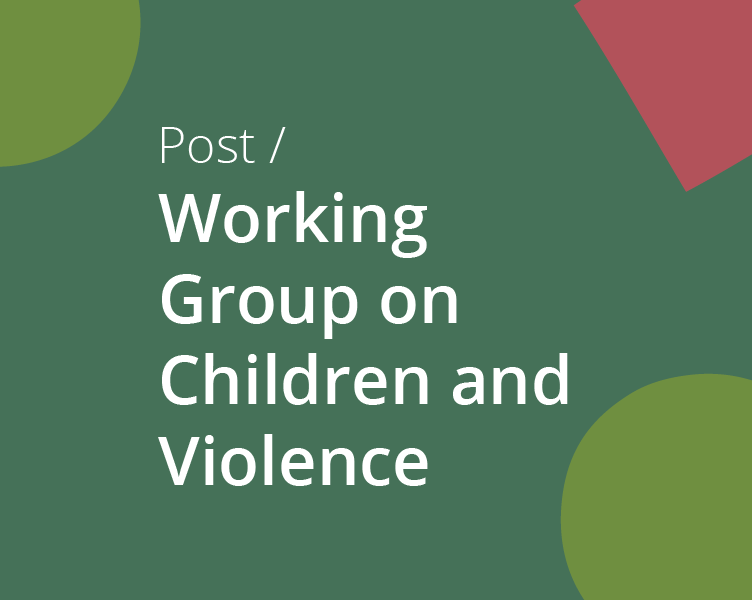Addressing the Mental Health of Children by Prioritizing their Social, Emotional and Spiritual Well-Being
The COVID-19 pandemic has had many negative impacts on the lives of children and adolescents. One particular area of concern is the consequences on their mental health and well-being. According to early findings from an international survey of children and adults in 21 countries conducted by UNICEF and Gallup – which is previewed in The State of the World’s Children 2021 – a median of 1 in 5 young people aged 15–24 surveyed said they often feel depressed or have little interest in doing things.[1] Children reported during the pandemic show an increase in anxiety, depression, loneliness, stress and tension.
While the impact on children’s lives is incalculable, we know that mental health issues have also devastating consequences in the economy, with an estimated loss of nearly $390 billion a year, according to the London School of Economics[2]. Even though the economic loss is so high, in upper and middle-income countries, annual expenditure on treating mental health is only about US3 per person, compared to less than US1 in the world’s poorest countries. More awareness about mental health issues is needed as well as higher investment and prioritization in social protection services as well across education, health and community-based programs.
Education plays a very important role in addressing the mental health crisis in children and adolescents by integrating social and emotional support and ensuring that children have spaces to speak about it without the risk of being stigmatized. Cost-benefit analyses show that there is a return of eleven dollars for every dollar invested in social and emotional learning interventions with sustained impact on academics, behavioral conduct, and emotional distress lasting up to 18 years later.[3]
Arigatou International and many other partners have been working during the last four years to understand the importance of the holistic development of children to protect them from violence and ensure their well-being. This work has led to the understanding of children’s spiritual development as a central aspect of children’s holistic well-being, which is closely connected to their social, emotional and cognitive development. Studies have shown that spirituality contributes to strengthening people’s resilience. Youth who as younger children were exposed to spiritual development demonstrated less aggressive behavior, less substance use, fewer high-risk behaviors, and less risk of depression.[4]
Article 27 of the Convention on the Rights of the Child states that “Every child has the right to a standard of living adequate for their own physical, mental, spiritual, moral and social development,” and yet the spiritual development of children is often under looked, excluded from children’s development discussions, or underemphasized in children’s rights approaches. The spiritual development of children does not refer to religious instruction, but to children’s capacity to relate positively with themselves, others, nature and with transcendence – in whatever way it is understood by them. The spirituality that connects these multidimensional relationships helps children to be grounded in their sense of self and helps them connect to their roots. It builds a sense of belonging, strengthens children’s identity, ethical values, prosocial behaviors, and positive relations with others. It also lifts children up to develop a sense of purpose and meaning around who they are, what they do, where they live and what they are meant to be and want to become, which is paramount for their mental health and psycho-social well-being.[5]
Addressing the current mental health crisis in children and adolescents due to the COVID-19 pandemic by prioritizing their social, emotional and spiritual well-being is critically important, besides prioritizing it in contexts of violence, conflict and fragility, where children experience trauma and adversities. A preventative approach is equally necessary to ensure children’s holistic well-being by strengthening their agency, self-awareness, capacity to manage their emotions, and positive relations with others, as well as strengthening their resilience. This can also act as a protective mechanism against violence as it provides tools for children to learn to de-normalize, identify, and speak out against violence that affects them.
Today more than ever, when the multidimensional crises that affect the world threaten to intensify the negative impacts on children, we all need to work together to prioritize investment in children’s holistic well-being, including their spiritual development, as a mechanism to address their mental health and as a contribution to their protection from violence.
2 UNICEF. The State of the World’s Children 2021 – On My Mind: Promoting, protecting and caring for children’s mental health.
3 Wodon, Q., C. Fèvre, C. Malé, A. Nayihouba, and H. Nguyen, 2021. Ending Violence in Schools: An Investment Case. Washington, DC: The World Bank and the Global Partnership to End Violence Against Children.
4 Miller, Lisa. 2015. The Spiritual Child: The New Science on Parenting for Health and Lifelong Thriving. New York. St. Martin’s Press.
5 International Consortium on Nurturing Values and Spirituality in Early Childhood for the Prevention of Violence. Nurturing the Spiritual Development of Children in the Early Years – A Contribution to the Protection of Children from Violence and the Promotion of Their Holistic Well-Being (2022) https://childspiritualdevelopment.org/2022/11/17/toolkit/
For any questions, please contact secretariat@childrightsconnect.org




